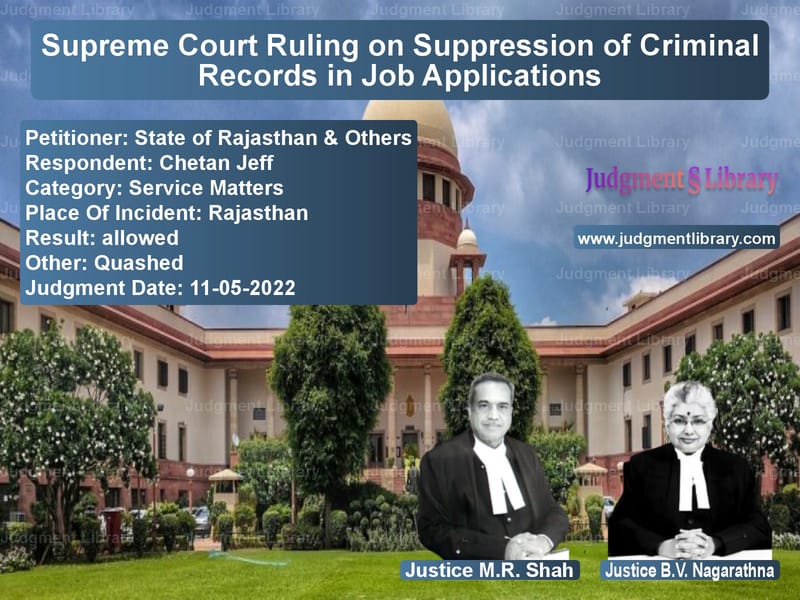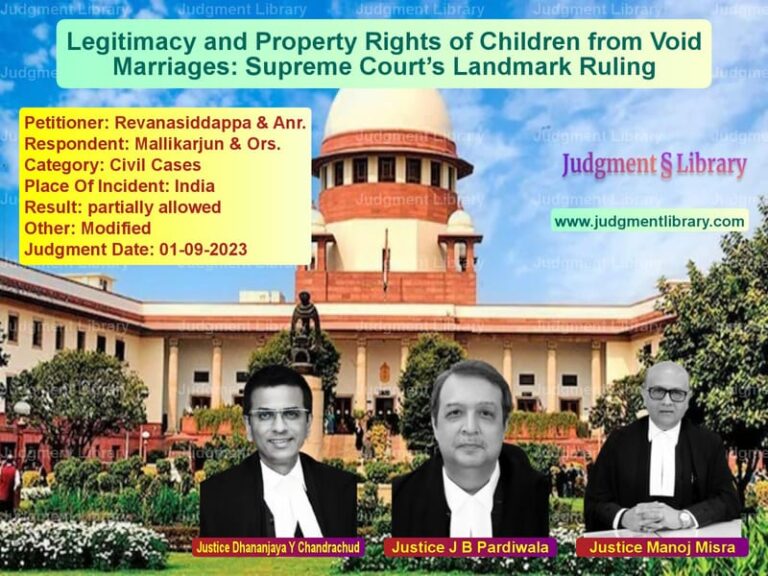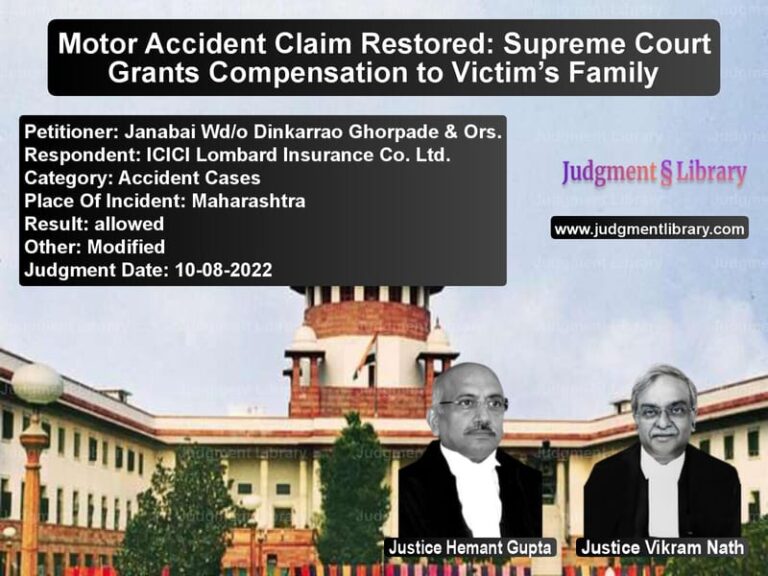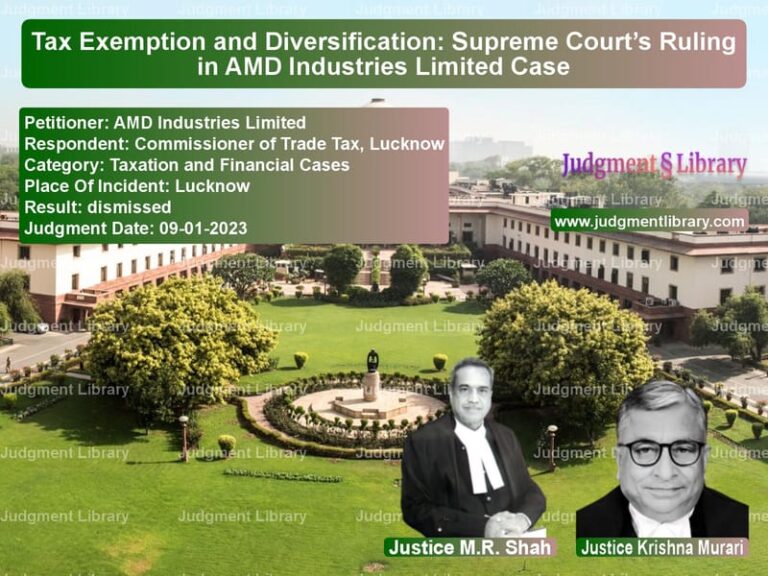Supreme Court Ruling on Suppression of Criminal Records in Job Applications
The Supreme Court of India in the case of State of Rajasthan & Others v. Chetan Jeff addressed a crucial issue regarding the suppression of criminal records in job applications. The judgment emphasized the significance of honesty in public service and ruled on whether a candidate who concealed past criminal cases could be appointed to a law enforcement position.
Background of the Case
The case arose from a recruitment notification issued by the Director General of Police, Rajasthan, in 2008 for various constable posts. Candidates were required to declare any criminal antecedents truthfully in their application forms. The respondent, Chetan Jeff, applied for the post of Constable (General) and submitted a job application form in which he stated that he had no criminal record.
However, it was later discovered that the respondent had multiple criminal cases filed against him, including:
- FIR No. 458/2007 registered at Police Station Neem ka Thana, Sikar under Sections 143, 341, and 336 IPC.
- FIR No. 102/2012 under Sections 147, 148, 149, 452, 380, 352, and 427 IPC.
- FIR No. 348/2018 under Sections 341 and 323 IPC.
- FIR No. 505/2018 under Sections 341, 323, 382, and 427 IPC.
Despite clearing the written and physical efficiency tests, his candidature was rejected due to the suppression of these criminal cases.
Arguments by the Appellants (State of Rajasthan)
Senior Advocate Dr. Manish Singhvi, representing the State, argued:
- The respondent deliberately suppressed his criminal record in Column 15 of the job application form, where he falsely stated that no criminal cases were pending against him.
- His suppression of material facts indicated a lack of integrity, making him unsuitable for the post of constable.
- As per the ruling in Avtar Singh v. Union of India (2016) 8 SCC 471, the appointment of candidates with suppressed criminal records should be denied.
- The role of a constable requires honesty and trustworthiness, and a person with a history of deceit cannot be trusted with law enforcement duties.
Arguments by the Respondent (Chetan Jeff)
The respondent, represented by Advocate R.K. Shukla, contended:
- The offenses were trivial in nature, and he was acquitted in some cases.
- In one case, he was convicted but granted the benefit of the Probation of Offenders Act.
- The High Court correctly ruled in his favor, stating that minor offenses should not be a ground for disqualification.
Supreme Court’s Observations
The Bench, comprising Justice M.R. Shah and Justice B.V. Nagarathna, noted:
- The post of constable requires the highest level of integrity as officers are responsible for maintaining law and order.
- The issue was not about the seriousness of the offenses but about the suppression of material facts.
- A person who conceals their criminal history in an official job application cannot be trusted to perform law enforcement duties.
- Merely being acquitted due to a compromise does not erase the fact that the candidate initially chose to hide criminal antecedents.
Key Judicial Precedents Referred
The Court relied on multiple judgments to support its ruling:
- Avtar Singh v. Union of India (2016) 8 SCC 471: Suppression of material facts regarding criminal antecedents in job applications disqualifies candidates.
- Daya Shankar Yadav v. Union of India (2010) 14 SCC 103: Integrity is paramount in uniformed services, and candidates must disclose past cases truthfully.
- Jainendra Singh v. State of U.P. (2012) 8 SCC 748: A person who conceals past offenses cannot claim a right to public employment.
Final Judgment
The Supreme Court ruled in favor of the State of Rajasthan and set aside the High Court’s decision. The Court held:
- The rejection of the respondent’s candidature was justified as he suppressed criminal records.
- Honesty in declaring past criminal cases is mandatory, even if the offenses are minor.
- Allowing such candidates in law enforcement would compromise the integrity of the police force.
Implications of the Judgment
This ruling reinforces the principle that candidates for public service positions must be transparent about their past. The judgment highlights that:
- Any suppression of criminal history, regardless of the offense’s severity, can disqualify a candidate.
- Employers have the discretion to deny jobs based on past misconduct, especially in law enforcement.
- The decision upholds the need for integrity in government service and deters dishonest disclosures.
The Supreme Court’s ruling sets a precedent ensuring that only individuals with unquestionable honesty and integrity enter law enforcement roles.
Petitioner Name: State of Rajasthan & Others.Respondent Name: Chetan Jeff.Judgment By: Justice M.R. Shah, Justice B.V. Nagarathna.Place Of Incident: Rajasthan.Judgment Date: 11-05-2022.
Don’t miss out on the full details! Download the complete judgment in PDF format below and gain valuable insights instantly!
Download Judgment: state-of-rajasthan-&-vs-chetan-jeff-supreme-court-of-india-judgment-dated-11-05-2022.pdf
Directly Download Judgment: Directly download this Judgment
See all petitions in Recruitment Policies
See all petitions in Public Sector Employees
See all petitions in Termination Cases
See all petitions in Legal Malpractice
See all petitions in Other Cases
See all petitions in Judgment by Mukeshkumar Rasikbhai Shah
See all petitions in Judgment by B.V. Nagarathna
See all petitions in allowed
See all petitions in Quashed
See all petitions in supreme court of India judgments May 2022
See all petitions in 2022 judgments
See all posts in Service Matters Category
See all allowed petitions in Service Matters Category
See all Dismissed petitions in Service Matters Category
See all partially allowed petitions in Service Matters Category







